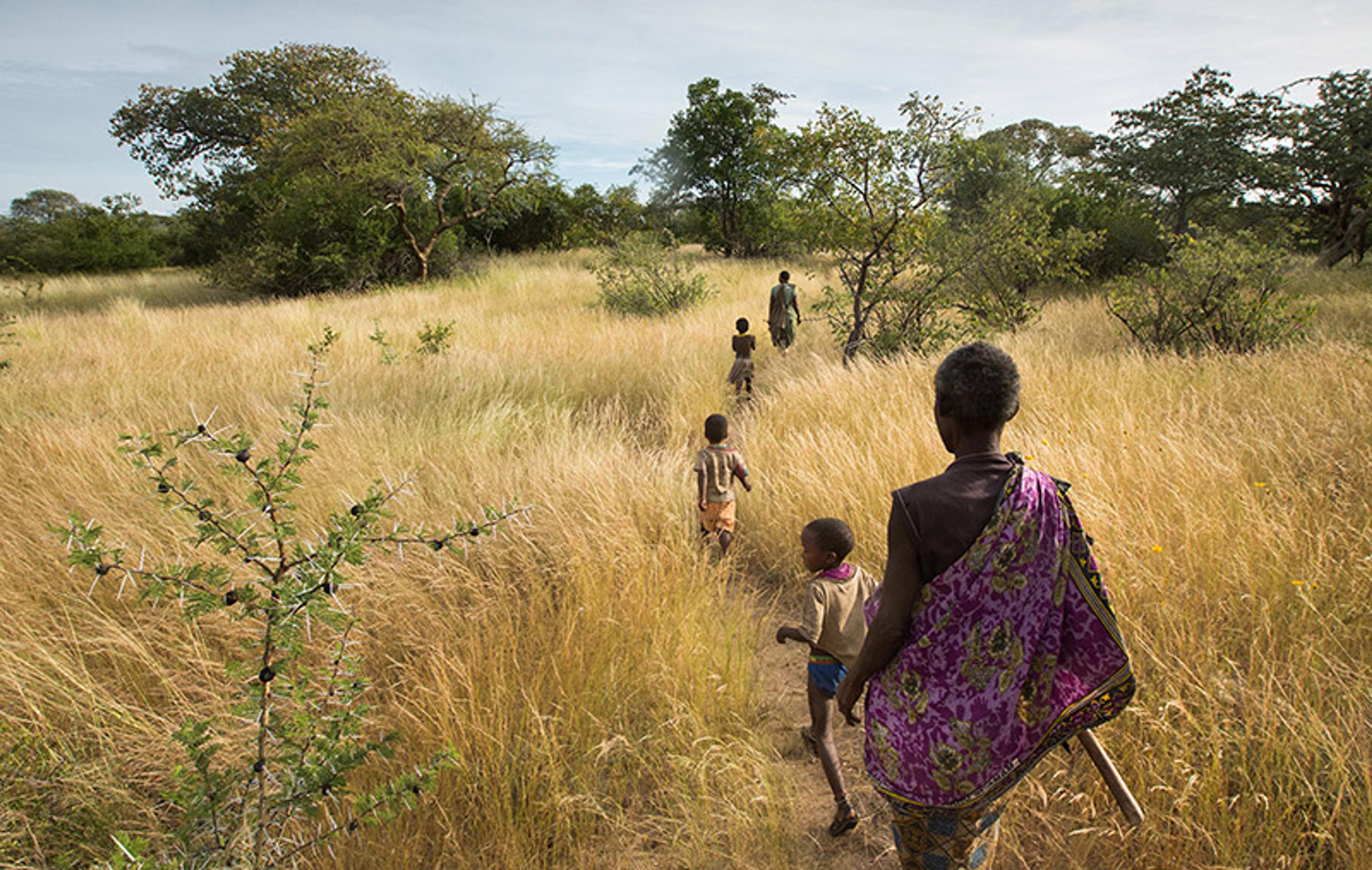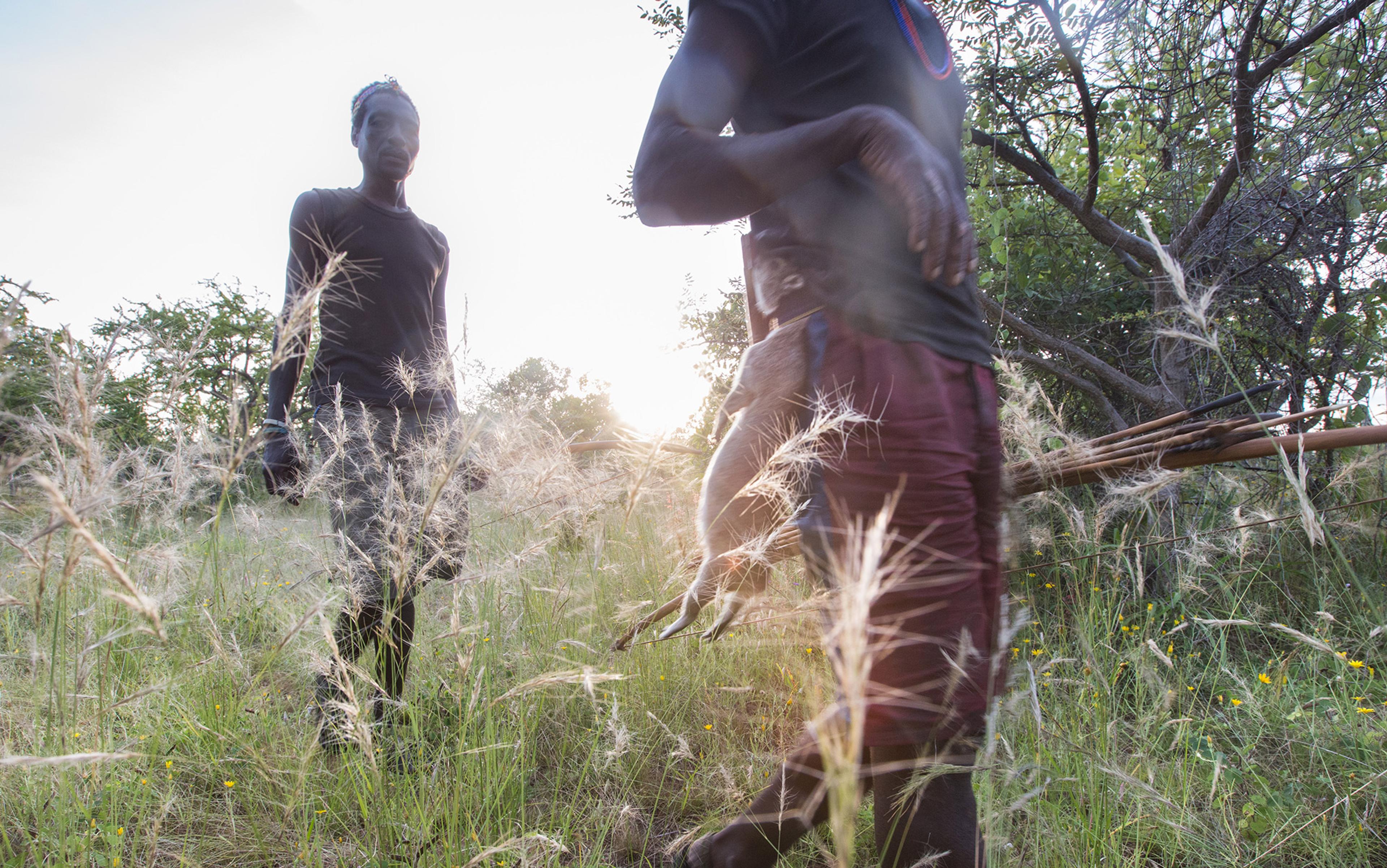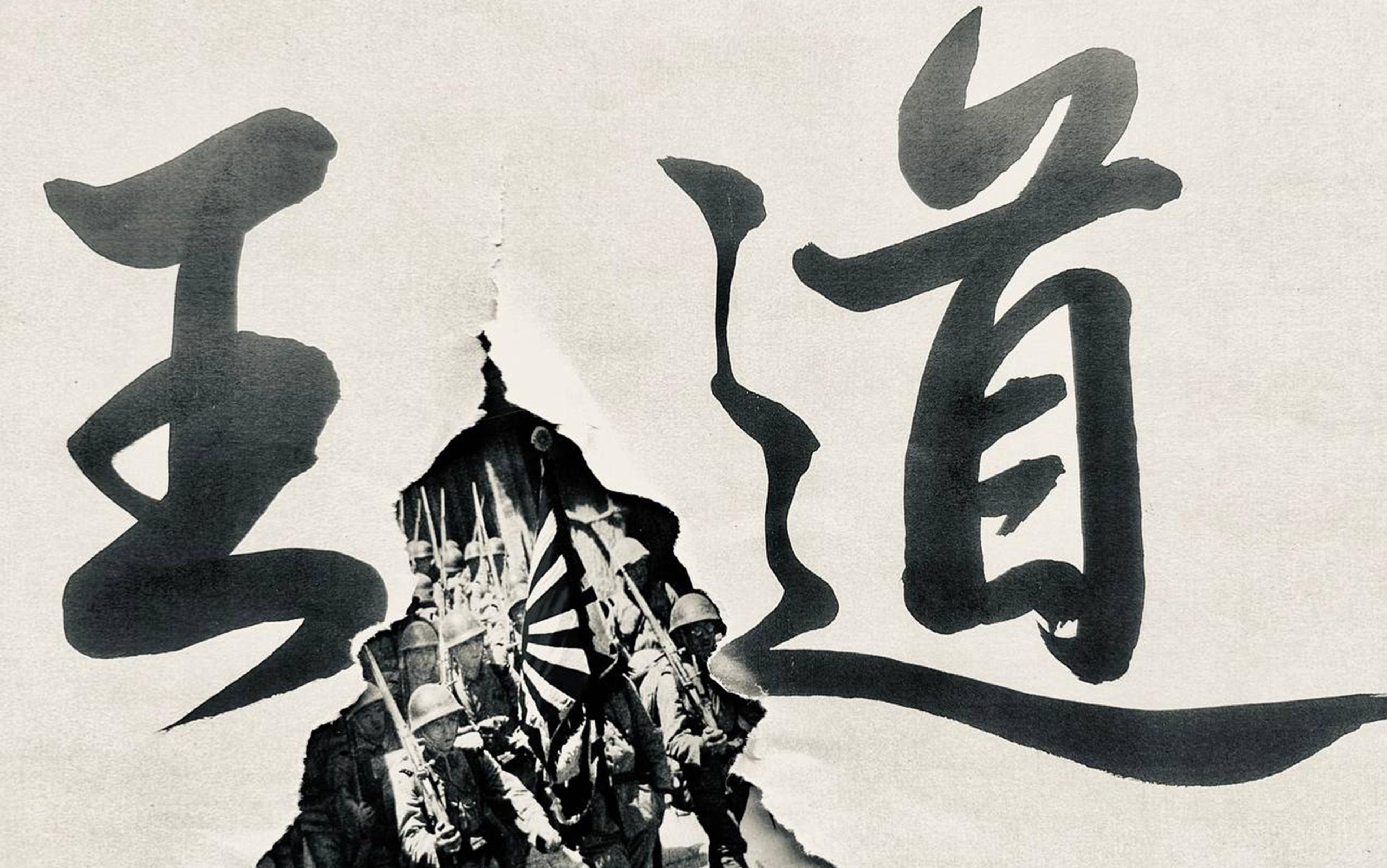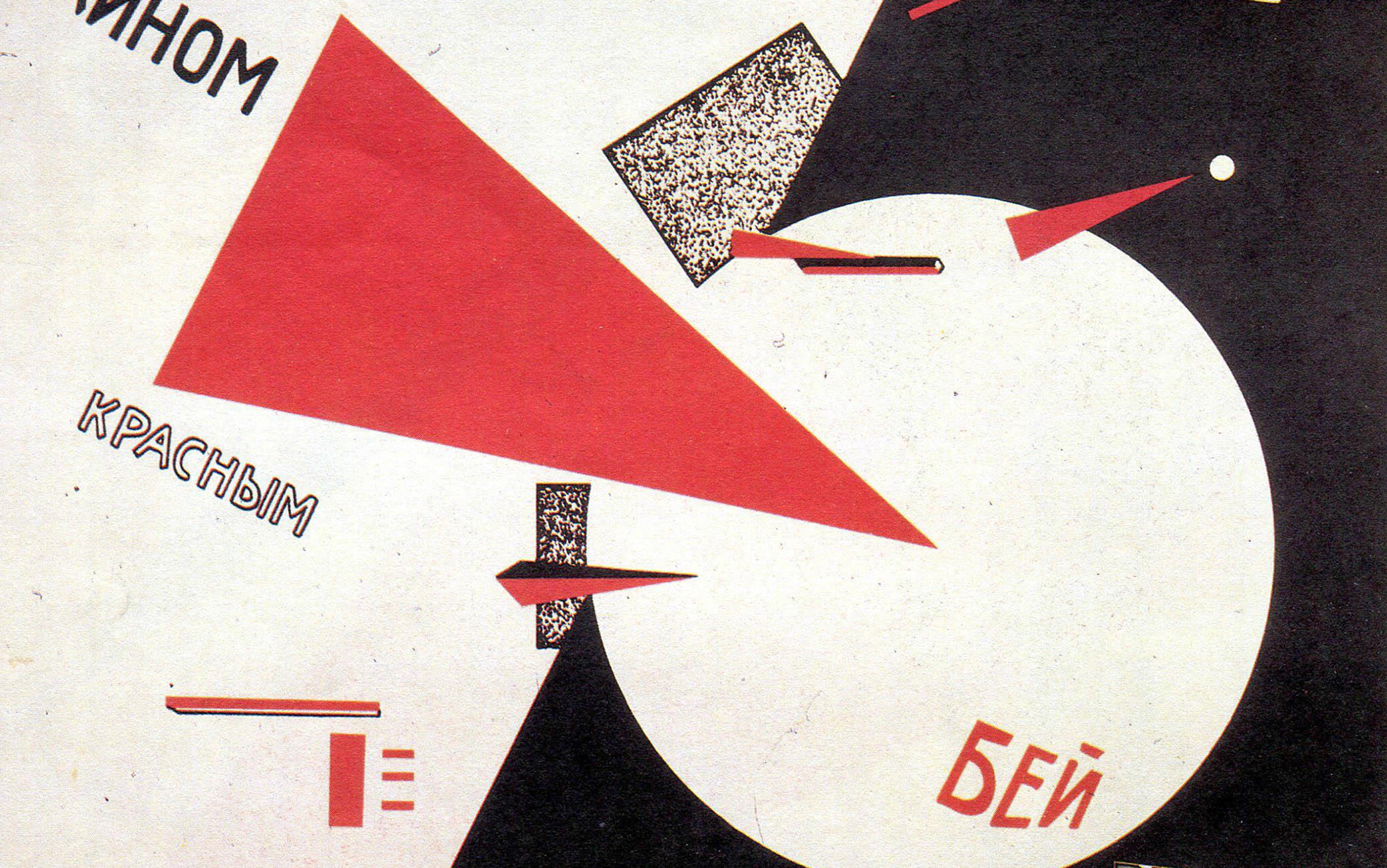In the seminar I teach about hunter-gatherers, I often ask my students whether they think life was better in the past or today. There are, of course, always a few people who insist they couldn’t live without a flushing toilet. But more and more I’m seeing students who opt for a life of prehistoric hunting and gathering. To them, the advantages of modern life – of safety and smartphones – do not outweigh its tangled web of chronic indignities: loneliness, poor mental health, bureaucracy, lack of connection with nature, and overwork. Learning about the lives of hunter-gatherers confirms a suspicion that our modern lives are fundamentally at odds with human nature, that we have lost some kind of primordial freedom. For a generation who came of age with Instagram and TikTok, this is a striking – albeit theoretical – rejection of modernity.
The idea that life in the past was better is, of course, not new, extending at least as far back as Jean-Jacques Rousseau’s noble savage. But the 20th-century version of the primitivist thesis can be traced back to ‘The Original Affluent Society’, an essay by the late anthropologist Marshall Sahlins. It is one of the most famous, and controversial, essays in all of anthropology, assigned in virtually every class in the discipline. It is the essay that redefined how we think about hunter-gatherers – and ourselves.
‘The Original Affluent Society’ came about in 1966, when anthropologists gathered at the University of Chicago for ‘Man the Hunter’, the conference that would give birth to modern hunter-gatherer studies. Up to that point, the popular view of hunter-gatherers was rather dim. Foragers were thought to be perpetually teetering on the edge of starvation, incapable of advancing themselves through technology, their lives embodying the phrase ‘solitary, poor, nasty, brutish, and short’ from Thomas Hobbes’s Leviathan (1651). To the anthropologist R J Braidwood writing in Prehistoric Men (1957), the foraging life was one of animalistic struggle: ‘A man who spends his whole life following animals just to kill them to eat, or moving from one berry patch to another, is really living just like an animal himself.’
But, unlike the political theorists advancing these ideas in the 19th century without ever having left their armchairs, a young anthropologist at that 1966 conference named Richard B Lee had actually lived among the Ju/’hoansi foragers of the Kalahari Desert of Southern Africa, one of the last populations of hunter-gatherers on Earth. Lee wanted to find out how hard it was for people like the Ju/’hoansi to make a living. Over the course of a month, he conducted in-depth measurements of time allocation. When he tallied up how much time was spent on subsistence tasks, or work, the number was surprisingly low: 12 to 19 hours per week.
Lee’s new data caused a stir. Sahlins, also an attendee at ‘Man the Hunter’, saw cause for a paradigm shift. In a discussion at the conference, he argued: ‘A fair case can be made that hunters often work much less than we do, and rather than a grind the food quest is intermittent, leisure is abundant, and there is more sleep in the daytime per capita than in any other condition of society.’ If the Ju/’hoansi worked only a few hours per day to satisfy their needs, in a desert no less, then life couldn’t be so harsh, and in fact, it must be pretty good, he said: ‘Adopting the Zen strategy, a people can enjoy an unparalleled material plenty, though perhaps only a low standard of living.’ Foragers like the Ju/’hoansi, Sahlins proposed, invert the logic of scarcity that underlies modern economic thinking: ‘this was, when you come to think of it, the original affluent society.’
Amid the counterculture movements of the 1960s, Zen economics went viral. ‘This Elysian community actually exists,’ gushed an article about the Ju/’hoansi in Time magazine in 1969. And nearly 60 years hence, original affluence has lost little of its appeal. That hunter-gatherers had an easy lifestyle is a linchpin of the philosophies espoused by Luddites, primitivists and degrowthers, and is intricately woven into civilisational narratives of a fall from an Edenic past, an idea popularised by Jared Diamond’s claim that giving up foraging for farming was the ‘worst mistake in the history of the human race’, setting humans on the path to inequality, poor health and more work. The anthropologist David Graeber suggested that Sahlins deserved a Nobel Prize in Economics for his insights.
The enduring appeal of ‘The Original Affluent Society’ can be traced back, in part, to a numerical coincidence. In his essay Economic Possibilities for our Grandchildren (1930), the British economist John Maynard Keynes predicted that forthcoming technological advances and economic growth would be so great that, by 2030, people would have to work only 15 hours per week, leaving the rest of their time for leisure and noble pursuits such as art, music and philosophy.
There is no reason to think that we will meet this target. After all, over time, we have worked longer and longer hours for higher and higher incomes, to skyrocketing work dissatisfaction. The congruence between Lee’s and Keynes’s numbers seems to confirm that we are living in an evolutionary mismatch of work, telling us that, at best, we are caught in work limbo, wedged between an idyllic hunter-gatherer past and techno-Utopian future.
Original affluence makes for a tidy story. And judging by recent popular depictions of hunter-gatherers – in books such as James Suzman’s Affluence without Abundance (2017), Rutger Bregman’s Humankind (2019) and Christopher Ryan’s Civilized to Death (2019) – it is still accepted at face value. But, in reality, our collective knowledge about human evolution and hunter-gatherers has advanced so radically in the nearly 60 years since ‘Man the Hunter’ that simple characterisations of hunter-gatherer life are no longer possible. The story has just gotten too complicated.
As an anthropologist who studies the behaviour and biology of hunter-gatherers, and has lived and worked among populations that Sahlins would deem to have ‘original affluence’, I find myself coming back again and again to ‘The Original Affluent Society’ in light of new advances in anthropology. I have realised that, when it comes to the discontent of modern working life, there is a far richer story about the evolution of work that needs to be told.
In Stone Age Economics (1972) – the book that elaborates on his original essay from ‘Man the Hunter’ – Sahlins drew four main conclusions about forager subsistence: people work only a few hours per day; their work isn’t physically demanding; they do not work continuously; and they ‘underuse’ their economic possibilities, meaning they could easily get more but stop when they have enough. For most of our species’ history, according to Sahlins, humans preferred leisure over more production.
Despite the popular success of ‘The Original Affluent Society’, its reception in anthropological circles was more tepid. ‘Has ever so little information produced so rapid and pervasive a reassessment of a major analytical issue?’ asked the evolutionary anthropologist Bruce Winterhalder. ‘The data of original affluence and the interpretative load they bear are simply incommensurate.’
The average across dozens of hunter-gatherer societies is 40 to 45 working hours per week
Sahlins’s numbers on hours worked came from just two populations: the First Nations peoples of Australia and Lee’s Ju/’hoansi foragers. Both were based on less than one month of data, and neither population was a stranger to outside influences. To be fair, Sahlins acknowledged this: ‘I must raise the possibility that the ethnography of hunters and gatherers is largely a record of incomplete cultures.’ If pushed to marginal lands, Sahlins reasoned, all the more impressive their leisure.
But there were significant problems with how the numbers were calculated. Most notably, the Ju/’hoansi number didn’t account for the time needed to process food back at camp, to make and maintain tools, and to do housework. In 1979, Lee himself performed re-calculations to arrive at a value of nearly 40 hours per week. And in recent years, anthropologists, including myself, have taken up the task of calculating hunter-gatherer working hours. When considering time out of camp as well as in-camp food processing and housekeeping tasks, the average across all well-studied hunter-gatherer societies is 40-45 hours per week, similar to the standard eight-hour working day in industrialised societies.

Even if 45 hours of work is three times Lee’s original number, it is by no means toiling. Besides, Sahlins was surely on to something: colonial administrators and anthropologists have long remarked on the apparent leisure of hunter-gatherers. The anthropologist Kristen Hawkes questioned why ‘Hadza men in general spend a puzzling amount of time sitting, often sleeping, in camp’. But, more importantly, original affluence lacks an evolutionary reference point. Humans are, after all, a species with a long evolutionary heritage – as primates, as great apes and, more recently, as hunter-gatherers. In that context, is hunter-gatherer leisure really so extraordinary?
The central goal of animals is to eat, argued Charles Elton, the founding father of modern ecology. And yet, most of the time, as Elton pointed out in Animal Ecology (1927), animals are doing ‘nothing in particular’. Further research has borne out Elton’s impression. In a study from 1981, the ecologist Joan Herbers found that laziness – as measured by the percentage of daylight hours spent inactive – was, in fact, widespread among animals. Lions lie around for three-quarters of the day, as do walruses. Chimpanzees spend nearly a quarter of their day simply sitting there, resting and digesting. Even in bee and ant societies, the classical paragons of hard work, most workers are inactive at any given time. In effect, most animals rest more than they work.
Should we now declare that all animals are also affluent, and have limited needs? Not quite. Biologists know that evolution operates with ruthless efficiency, so any apparent laziness we see in animals must serve some kind of function. In the 2010s, Daniel Charbonneau, then a postgraduate in biology studying ants at the University of Arizona, decided to examine what, if anything, inactive workers in ant societies were doing. Through experiments with the ant species Temnothorax rugatulus, Charbonneau found that colonies maintain a pool of inactive workers to step in when new work arises or when other workers get lost, and they sometimes help to store food. Other research has shown that having inactive workers around to replace fatigued workers leads to better long-term success of the colony.
Although an economist, Keynes was thinking like an evolutionary biologist when he wrote: ‘[W]e find that the economic problem, the struggle for subsistence, always has been hitherto the primary, most pressing problem of the human race – not only of the human race, but of the whole of the biological kingdom from the beginnings of life in its most primitive forms.’ This statement emphasises the evolutionary continuities between humans and other animals. But Suzman sees things differently. Building on Sahlins, in Affluence without Abundance Suzman argues that the wants and needs of the Ju/’hoansi were few because the environment provides all that is needed. Indeed, hunter-gatherers commonly see the world as a giving environment. Accumulation makes little sense in such a world because there will always be more. It’s also a good reason to avoid agriculture. One Ju/’hoansi man asked: ‘Why should we plant, when there are so many mongongo nuts in the world?’
Early humans were limited by energy and time. Their economic problem was very real, and it was severe
In this view, hunter-gatherers do not face the ‘economic problem’ at all. According to Suzman, primitive affluence shows the economic problem was not a ‘permanent condition’ of humanity, but only arose with farming. But the postulate of ‘limited needs’ has not fared well under rigorous scrutiny. For one, using time as an index of both need and productivity is fatally circular. Second, it simply doesn’t describe hunter-gatherer behaviour very accurately. For example, this idea would predict that, when food is highly abundant, foragers should devote less time to foraging. Instead, the opposite tends to be more common, suggesting alignment with a rational economic strategy.
To deny hunter-gatherers the economic problem is to say there is some unbridgeable gulf between humans and other animals, if not to deny hunter-gatherers agency altogether in the face of ecological challenges. Prehistory was no walk in the park: until the Neolithic revolution, population sizes were small, and infant mortality was high. About 70,000 years ago, our ancestors experienced a population bottleneck that almost plunged our species into extinction. In other words, early humans were limited by energy and time. Their economic problem was very real, and it was severe.
Indeed, time and energy are limited resources for all animals, and each species evolves its own unique solution to the economic problem. Research like Charbonneau’s shows that the function of inactivity in ant colonies is closely linked to the way natural selection shaped them to deal with the fundamental problems of food acquisition. In spite of ecological challenges, hunter-gatherers often seem to be doing nothing at all. What kind of animal does that make us?
One night, in the summer of 2016, I was sleeping in my tent when I was awoken by a commotion in the distance: a screaming animal. I was in a remote rainforest camp during my research with the Batek tribe, a small group of hunter-gatherers in Peninsular Malaysia. For the past few days, there had been little more than rice in camp. That was about to change. Minutes later, a man emerged from the darkness and into the firelight of camp. Slung over his shoulder was a long bamboo blowpipe and three monkeys, bloodied and tongues lolling. He dropped them at his feet. A teenage boy dragged them to the fire for butchering. Before long, the camp was feasting on a midnight snack of boiled hearts and roasted intestines.
As I learned that night, the human foraging adaptation is an evolutionary marvel. Hunter-gatherers do hard things with unpredictable outcomes, like hunting big game or climbing massive trees for honey. We can afford to do this because we are cooperators par excellence, sharing food profligately whether it’s hunted game or gathered tubers.
With hunter-gathering, the human working day was cut nearly in half compared with that of chimpanzees
Hunter-gatherers are the original knowledge workers, cultivating hard skills with decades of practice. Until the age of 20, hunter-gatherer kids don’t pull their own weight, burning more calories than they themselves produce. But, once their skills are sharpened, they are extraordinarily productive, hauling in a surplus that would be widely shared. For big game, most hunter-gatherers maintain strict social norms dictating that everyone has a collective right to these resources. When our ancestors started to hunt and gather, they unwittingly stumbled upon the most enduring and effective insurance policy ever known.
The origins of hunting and gathering are murky, but things began falling into place as far back as 2 million years ago. That’s when the game changed: we took up cooking and running, and men and women started to divide and share labour, including childcare, with others. With the help of increasingly sophisticated tools, we ruthlessly extracted new foods from savannahs and woodlands. The earliest stone tools were lightly modified rocks but, over time, they got sleeker, sharper and pointier. These technological improvements would have made it quicker and less energy-demanding to kill and butcher animals, and to process plant foods like underground tubers.
What did our ancestors do with these newfound efficiencies? When comparing the time-allocation patterns of the great apes with modern hunter-gatherers, it becomes clear that, with the advent of hunting and gathering, the human working day was cut nearly in half compared with that of chimpanzees, who must keep moving and chewing for eight hours per day. But hunter-gatherers perform their work in short order, and then return to camp. Even with the foraging done, there is still work at camp: food processing, cooking and housekeeping. And in a camp protected by fire and friends and family, we can socialise and rest in peace.
To see why our ancestors cut their day short rather than continuing to gather food, we need to go beyond time and consider another currency: energy. Over the past 10 years, there has been a revolution in our understanding of human energetics. At the forefront of this movement is the anthropologist Herman Pontzer at Duke University in North Carolina, who has conducted physiological research showing that humans are a high-energy ape. Even with the reduced energy costs associated with smaller gut size, humans burn more energy per unit of body mass than our great ape cousins. ‘The way we take those calories in and burn them off shapes every aspect of our existence,’ writes Pontzer in his book Burn (2021). In this case, hunting and gathering literally transformed how our cells and organs process energy.
For a long time, scholars thought that gains in foraging efficiency from technological progress and low-cost locomotion provided early humans with the extra energy to fuel that most expensive and important organ: our brains. In 1991, the anthropologists Robert Foley and Phyllis Lee wrote that ‘some early hominids had greater amounts of energy available to them because they were able to exploit resources more efficiently and at lower energetic costs. This in turn provided the energetic basis for high rates of encephalisation.’ The idea is tempting and intuitive, but until recently we didn’t know if it was true.
In 2017, my colleagues and I, led by Pontzer and Thomas Kraft, set out on a calorie- and time-counting quest that would help to solve this puzzle. The goal was simple: to find out how many calories hunter-gatherers and farmers produce over the course of a day, and to also measure how much time and energy they spend doing it. We hauled out fancy metabolic equipment to remote jungles and savannahs, in order to work with folks like the Hadza foragers of Tanzania and the Tsimane hunter-horticulturalists of Bolivia, and we carefully studied how people used energy when they were foraging, whether it’s hunting or the gathering of fruits and tubers by women.
Paradoxically, it is hard work that explains hunter-gatherer laziness
What we found upended the traditional view. Surprisingly, despite using fancy tools and our shortened working day, humans burn lots of energy to get our daily bread. Chimpanzees walk and climb, but mostly they just sit and pluck fruit. In contrast, hunter-gatherers expend nearly three times as much energy: they dig and chop and walk and run long distances, and dig and chop, the original activities that endowed us with the extraordinary aerobic capacity we now use to run ultramarathons. Nevertheless, hunter-gatherers acquire so much energy from the environment that they can afford to burn a lot in the process, leaving more than enough to fuel the collective brain of the group.
Paradoxically, it is hard work that explains hunter-gatherer laziness. In humans, a species hard-wired for work, laziness is not a luxury, it’s a necessity: we must relax and save energy when we can. Stone Age Economics is rich in examples of historical impressions of foragers that are highly polarised, alternating between the vigour of the food quest and the leisure of camp life. It turns out that the ‘necessary cycle of extreme activity and total idleness’ – in the words of the French philosopher Marquis de Condorcet in 1795 – are really two sides of the same coin. The foundational insight of original affluence – that humans prefer leisure over production – is premised on a false dichotomy. If hunter-gatherers work very hard to produce a lot, maintaining their leisure all the same, in what sense can we say that leisure is preferred over production? As with ants, hunter-gatherer leisure aligns with their own peculiar solution to the economic problem.
At its core, original affluence is thoroughly materialist. According to Winterhalder, it is ‘so closely aligned to micro-economic principles that one might almost suspect it of being a cleverly disguised ruse.’ To explain why wants and needs are few among foragers, Sahlins answers that foragers place supreme cultural values on mobility. But these values emerge, ultimately, because movement is costly, and goods are widely shared, making accumulation difficult. This is the strange thing about Sahlins. So often he unleashes a bombastic indictment of materialism, only to proceed to sketch an alternative that is itself materialist. Despite his open hostility to rationalist approaches to understanding human behaviour, Sahlins was, paradoxically, its most eloquent spokesman.
The evolutionary foundations of original affluence may be shaky, but still: why does Sahlins’s framing feel so true? I’ve come to realise that the empirical facts of his essay have little bearing on its main point, which is, in the end, really about our values. For most of us, the industrialised system is the only one we have ever known; to be a hunter-gatherer is not an option. But some scattered populations around the globe, like the Batek, still have some choice in the matter. By looking at what happens to foragers when they are thrust into globalised market economies, we can gain some insight into what went wrong in our own relationship to work.
I once drove through Peninsular Malaysia with an economist friend to visit the Batek. Along the way, we travelled through endless plantations of palm oil. Now and then, we came across gigantic tree stumps, poignant reminders of a former world. Palm oil plantations contain living and breathing trees but, in fact, they are just deserts of green, virtually devoid of life. I bemoaned the staggering loss of biodiversity. Then, to my surprise, my friend praised the oil palm industry. After all, she argued, it was an efficient crop, and it was bringing development to people out in these rural areas, giving them livelihoods, and raising their standard of living. In purely economic terms, she may be right.
I can’t help but think we have lost some elemental part of our humanity in the industrialised world
But she didn’t know about the kind of life that people like the Batek had lost amid these sinister green ruins. The water is dirty, the forests are logged, and villages are isolated, surrounded by large tracts of oil palm where there was once forest. Over the past 40 years, some Batek have gone from nomadic foraging and living in palm-thatch huts to living in concrete houses and working at a nearby plantation or mine, the very industries that make foraging impossible. Some Batek alternate between the foraging and the wage-labour lifestyles, ‘engaging with modernity with the hands and minds of hunter-gatherers,’ as Suzman puts it. In their world transformed from richness to scarcity, it is a cruel twist of irony that these foragers of original affluence often spend the day doing nothing.
When I think of the Batek’s plight, I can’t help but think that we have lost some elemental part of our humanity in the industrialised world. Our society’s fetish for innovation and our faith in progress contains within it, according to the agrarian writer Wendell Berry, ‘a hatred of the past, of all things inherited and free.’ By turning our gaze toward the noble aspects of the forager life, the original affluent society teaches us that maybe, after all, there is much to love about the past.
Anthropologists have long emphasised the collective nature of foraging – of doing work – but we ought to consider as well how rest is a collective experience that has shaped our evolution. When ants do nothing, they really are just doing nothing. In contrast, leisure time in humans is not just an absence of work, but a form of socialising, organic if unpredictable, synchronised to the ebb and flow of the natural world. Rest is enjoyed in the company of others but is also the reward for work done in the service of others. And, like the Sabbath day of Abrahamic religions, forager rest is enforced by social norms. The anthropologist Jerome Lewis described a Mbendjele forager who would have made an excellent capitalist: this man worked hard, too hard. He hunted all the time. He hunted so much that it started to bother his campmates. By hunting so much, it was said, he was elevating himself above others. He was eventually ostracised from the group.
Rest allows the very things that make us special as a species: the capacity to listen and think and daydream. Living among the Batek, I was always impressed by the ability of people to simply sit there and seemingly do nothing. What a contrast to our own society, where people would rather be shocked by electricity than sit alone with their thoughts.
This newfound efficiency is simply a pathway toward putting more things on our plates
It is a delusion to think that work is a Neolithic or capitalist invention. The apotheosis of this view may be found in the writings of the anarchist Bob Black, who, building on Sahlins, admonished that ‘[n]o one should ever work.’ As we have seen, this idea is false: work has always been with us, just one part of an intricate web of interdependent relations connecting humans to other humans, and humans to their local landscapes. The human body and its mechanical potential do not belong only to the individual but to society at large. Hunters bring large game back to camp in the full knowledge that they will lose it all. Today, many of us are doing the wrong kind of work, one that rejects sociality, craft and meaning, turning people into machines. In contrast, the physical, mental and social are inextricably linked in hunter-gatherer work. Modern life has been stripped of these connections, and compartmentalised for the sake of efficiency and comfort. Lee wrote of the Ju/’hoansi: ‘everyone worked and everyone used both hands and mind.’ Shorn of its original social context and multiplicity, the human body in today’s world is adrift and sick.
In 1865, the economist William Stanley Jevons wrote a book about coal. He started with the observation that when the Watt steam engine was introduced, coal production increased unexpectedly. If the steam engine increased the efficiency of energy production, why would coal production go up? The answer was simple: reduced costs stimulated more demand. Wrote Jevons: ‘and eventually the greater number of furnaces will more than make up for the diminished consumption of each.’ The Jevons Paradox is everywhere. When the cotton gin was introduced in the mid-19th century, its increased efficiency at separating cotton seeds from the fiber meant more labor was needed for other parts of the production process. Instead of decreasing demand for slaves, it led to more slavery than ever.
‘[I]t is questionable if all the mechanical inventions yet made have lightened the day’s toil of any human being,’ wrote John Stuart Mill in Principles of Political Economy (1848). Indeed, our lives today are the Jevons Paradox in microcosm. Frictionless technology at our fingertips leads to the paradoxical situation of our smartphone screens becoming crowded with apps, our days increasingly divided into small things, and our attention shattered. Things that were meant to make our lives easier simply tempt us to put more things on our plates, increasing the amount that we work, and wreaking havoc on our wellbeing.
And yet, when we consider work from an evolutionary perspective, it is hard to be optimistic about technological efficiency delivering us to the promised land of Keynes’s 15-hour working week. In this age of unprecedented burnout, it may give some solace to consider that the Jevons Paradox has been with us since time immemorial. Our industry is the blessing and curse of our species, a mindset and cultural force shaped by the evolutionary process, and stamped into the very fibre of our being.






